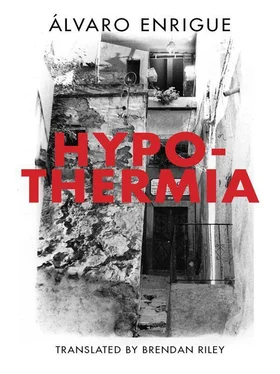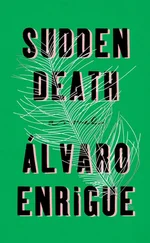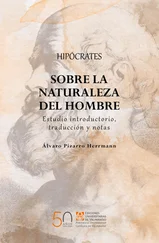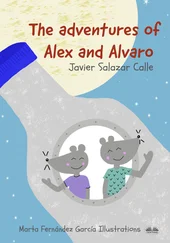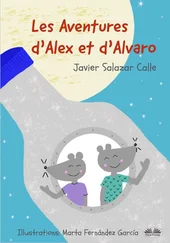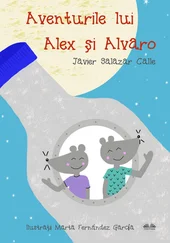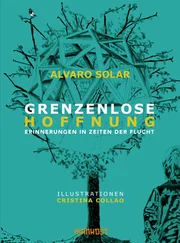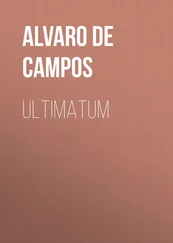I caused a minor scandal during lunch by ordering normal-sized portions of food for a healthy adult; even worse, I drank two beers. It was a seafood restaurant located across the street from the wharf. We ate on the second floor, which had a view of the ocean. All the locals from Lima — businessmen, office workers having affairs, leisurely young millionaires — were eating lunch downstairs, watching the parking lot and the street, ignoring the heaving, steel-colored sea that was, perhaps, too menacing for their fragile, decadent, Creole aplomb. The crowded tables, the cut of the suits, the gelled and sprayed hairdos, the waiters conscious of their inferior birth, all reminded me again of Mexico.
The Swiss ordered a plate of ceviche to share between the three of us, and a salad for each; to drink, water. I couldn’t hold back any longer, so I went for a second dish, simple with plenty of food: grilled fish served over puréed potatoes, with a caper salad on the side. I had to eat quickly so that I could order dessert and coffee before they called for the check and dragged me outside to keep filming.
On our way back to the hotel in Miraflores, toward the end of the afternoon, despite the heavy traffic, a fresh, stiff breeze was blowing in through the car windows. At the corner of one street we came to a bridge connecting the outcroppings on either side of a ravine which led out to the district’s local beaches. We were driving slowly, so I was able to see that the bridge crossed over a truly frightening drop. Is this the Suicide Bridge? I asked the driver. He nodded his head. I noticed that one side of the bridge already had a fence, while another was being installed on the opposite side. I had an atrocious attack of vertigo, perhaps because during the conversation that morning I’d imagined the driver was exaggerating — fueled, like all his colleagues, by the morbid trivia disseminated by radio newscasts. They’re putting up a fence so people don’t jump off anymore, I said, almost to myself. The driver maintained such a grave silence while we crossed the bridge that I imagined it was, for him, a cursed spot: like me, he might have suffered from incurable lovesickness.
It’s the cholo blood, he said to me when we’d returned to solid ground; to fly away when the earth has lost its dignity, like a condor. I couldn’t resist asking him if the Incas were cholos . With an indifference that bespoke his empty life, he said that he imagined they were.
III
Once back at the hotel, I barely had time to change my shirt, tie, and jacket for the dinner at Terapia’s house, which was the thing that interested me most about the whole trip. Despite dressing in such a terrible hurry, I still ended up getting back down to the reception area late and rather disheveled: the rhythms of a man inhabiting an imaginary seventeenth-century apparently don’t mix with those of the lunatic tribes running amok in the clamorous twenty-first.
The other chefs and producers were already sitting in the armchairs by the vestibule leading to the street. For the first time, I noticed that my producer was very good looking. She’d put on a flowered dress and brushed on the very slightest hint of makeup. Her hair, untouched, hung loose.
Swiss women, like their gringo counterparts, have an infantile notion of beauty; they want to be pretty, not lethal. They come from cities untouched by Baroque liturgies, and societies that never enjoyed the dubious privilege of being shaped by the customs of a Bourbon court. They don’t know that the body is simply a corpse in the making, that seduction is an assassin’s game, that beauty is not bright but monstrous. As Rilke said, it’s as much terror as we can endure. It’s what the one who falls in love loses because it has to stay here on earth, a pilgrim stripped of its own soul.
But Swiss women aren’t birds, and she could never understand the flighty anxiety of lovers from Lima. Like gringos, the Swiss long to be happy, while we Latin Americans aspire to burn, nailed to the axis of piety. I was Teresa’s pilgrim, and I couldn’t stop wondering if my stay in Lima wouldn’t end up turning me into her condor.
I was able to approach, albeit briefly, the presumably Argentine chef, who was speaking with a Venezuelan mulatto. The other three chefs — especially the other Mexican — kept their distance, clinging tightly to their producers out of a crazed desire to win.
This time a bus was waiting for us outside the hotel. I was nervous but excited: during one of the endless breaks throughout that day’s filming, the producer had explained to me that as charisma was one of the criteria in judging the winner of the Lard broadcast, each contestant would have a chance for a private, pre-dinner conversation with Max Terapia.
I’d never spoken with — nor do I believe that I’ll again speak with — one of the chefs from the heroic period of Latin American cooking, so the ten or fifteen minutes allotted me seemed sufficient to avoid any unpleasant silences. I walked to the bus with the Venezuelan and the Argentine. The three of us agreed that the best thing about the trip was meeting Max Terapia. Once aboard the bus they split us up again.
I made the trip in silence. First, because of the rage I felt thanks to their treating us like children: each one of us had his own assigned seat. Next, because I was so nervous that I’d soon be meeting the legendary chef. Finally, because of how ominous the Suicide Building looked at night — we had to pass right by it to reach the city’s nineteenth-century district. The turn round the traffic circle that ran below the building gave me the shivers once more.
The house where Max Terapia lives is nothing special: it’s basically an old crumbling building on a commercial street. The ground floor has a rolling iron shutter and the only thing distinguishing it from the other buildings — this isn’t obvious until you get close — is a security buzzer connected to a closed-circuit camera. My producer, the sole woman among eleven men, was also, amid a silence barely broken by sporadic whispers, the only one who dared press it.
Although I’d expected to be ushered in by some horror movie butler, it was Terapia himself who answered and then, a minute later, opened the door for us. He greeted us all, shaking our hands with a natural ease, the last thing I would’ve expected from a star of his caliber. He knew all six competitors by name. He pronounced mine with a Catholic schoolboy’s accent appropriate to Lima’s upper classes, noticeably weighting the first accented vowel then letting the rest fall into silence with princely disdain. Until that moment, I hadn’t realized how my unease also came from the way people in Lima speak Castilian, working it between their tongue and palate with a jeweler’s precision: like people from Mexico City, their delivery is grounded in verbal voluptuousness, not precise meaning. Terapia was dressed in some standard-issue drill pants and a sky-blue shirt. He looked older than the face on his cookbooks and memoirs.
The room we entered was dark, barely illuminated by the light from an enormous elevator, like one in a museum, standing open at the far end of the room. This is my younger son’s sculpture studio, he explained as he led us toward the elevator. He lives in New York, Terapia continued, but he comes here to work in the winters because it’s too harsh there. He pressed one of the buttons on the panel then turned to me. You live in Washington, don’t you? Until that moment he had simply spoken by way of general announcement, the way famous people do so that everyone can enjoy their witty remarks. Yes, I told him, but the winters there aren’t so cold. D.C. is in the South, two or three hours south of the Mason-Dixon Line. And do you return to Mexico often? The air thickened with a deadly electricity, produced by the others’ jealousy at the prospect of my life seeming more interesting to Terapia than theirs. My producer was the only one who smiled when I said no, that I’d never returned since I left. The elevator stopped. I was like that when I was young, Terapia said, in London for nine years without returning to Peru, partly because I went into exile, and partly because I had no money. Then the door opened and we realized that the time we’d shared in the elevator was to be our moment of greatest intimacy with him: the flat where he lived with his wife had been converted into an enormous set for Swiss television.
Читать дальше
